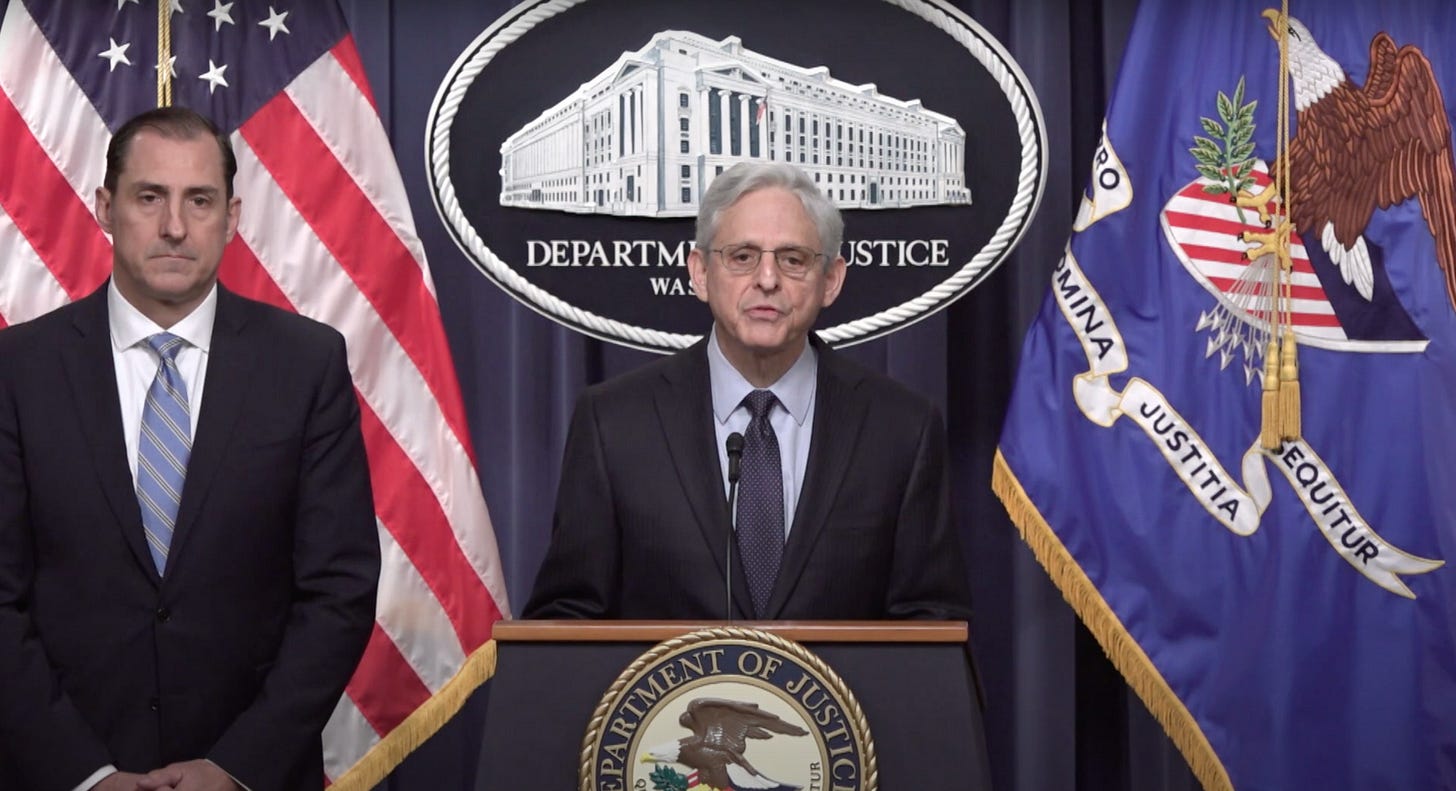Another special counsel
The key facts to know about the Biden documents case and the new special counsel, plus the questions still lingering.
Good morning! It’s Friday, January 13, 2023. The 2024 elections are 662 days away.
Housekeeping note: There will be no newsletter on Monday for MLK Day. I hope you all have a great weekend, and I will see you back in your inbox on Tuesday!
📣 If this newsletter was forwarded to you, subscribe here. If you want to contribute to support my work, donate here.
Garland appoints special counsel in Biden documents probe
Attorney General Merrick Garland appointed a special counsel on Thursday to investigate President Joe Biden’s handling of government documents, after three batches of classified Obama-era materials were found in his home and private office.
Biden is now the second consecutive president to face a Justice Department investigation over classified documents; Garland appointed Special Counsel Jack Smith in November to probe former President Donald Trump’s actions after the 2020 election and his handling of thousands of official documents found at Mar-a-Lago.
Special counsels 101
Before we get into the details of the Biden case, I always like to start out with a little civics lesson to give you the proper context. So since it’s been a long time since the days of Bob Mueller (or feels like it has been), I thought we’d do a quick refresher on special counsels.
Special counsels are different than independent counsels, a now-defunct position that was created by Congress after Watergate. The attorney general decided when to appoint an independent counsel, but the prosecutor in question was then chosen by a three-judge panel. Independent counsels had broad jurisdiction to carry out their investigations as they pleased, with little oversight from the Justice Department.
After both parties had negative experiences with independent counsels — namely Laurence Walsh’s Iran-Contra probe under Reagan, and Ken Starr’s Whitewater probe under Clinton (which morphed into a much broader investigation and eventually an impeachment) — Congress let the independent counsel statute expire in 1999. As a replacement, the Justice Department introduced regulations creating the special counsel, who would be more independent than the average prosecutor but less independent than the independent counsels.
The attorney general decides not only when to appoint a special counsel, but also who will serve in the role. Unlike for independent counsels, the AG is also empowered to set the scope of inquiry for a special counsel, and has the ability to overrule them when it comes to filing criminal charges.
For the first decade of the special counsel regulations, there were exactly two appointed. Then, during the Obama era, zero were appointed. Now there have been four in just the past five years, including Mueller and Smith, a veritable proliferation of special counsels that reflects the increasing politicization of Washington investigations.
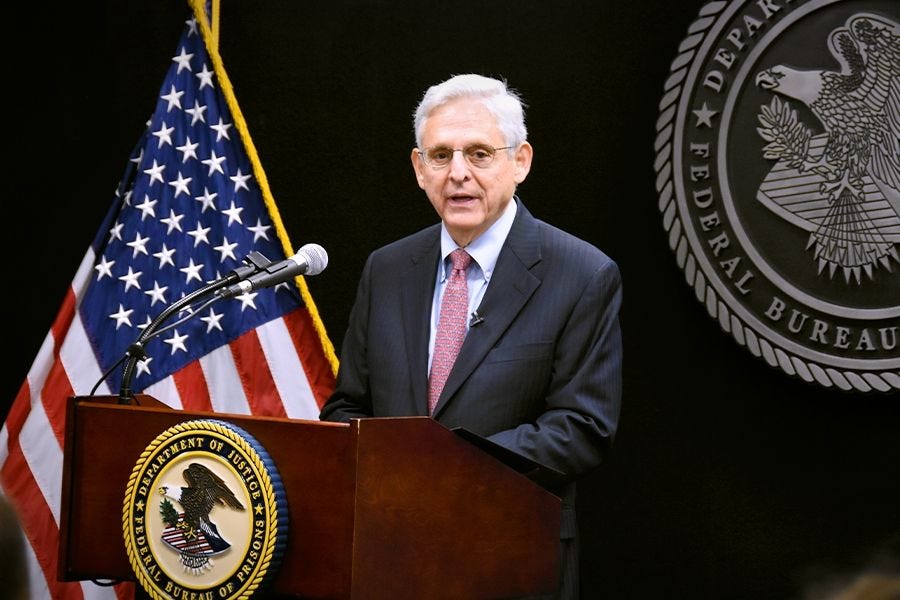
Meet Robert Hur
Garland announced Thursday that he was tapping Robert Hur to take over the Biden documents investigation as special counsel. Hur, although currently in private practice, is a longtime Justice Department official.
A graduate of Harvard and Stanford Law who clerked for then-Chief Justice William Rehnquist, Hur has held several senior positions in the DOJ, including as the Trump-appointed U.S. attorney in Maryland.
Hur has worked closely with some of the most notable prosecutors of the era. During the Bush administration, Hur was a top deputy to Christopher Wray, who is now the FBI director. Under Trump, he was the No. 2 for Rod Rosenstein, then the deputy attorney general; in that role, he directly supervised Robert Mueller’s special counsel investigation.
“He knows what he’s getting into because he’s seen it before,” Rosenstein told Bloomberg of Hur’s new posting. “I will conduct the assigned investigation with fair, impartial, and dispassionate justice,” Hur promised in a statement on Thursday. “I intend to follow the facts swiftly and thoroughly, without fear or favor, and will honor the trust placed in me to perform this service.”
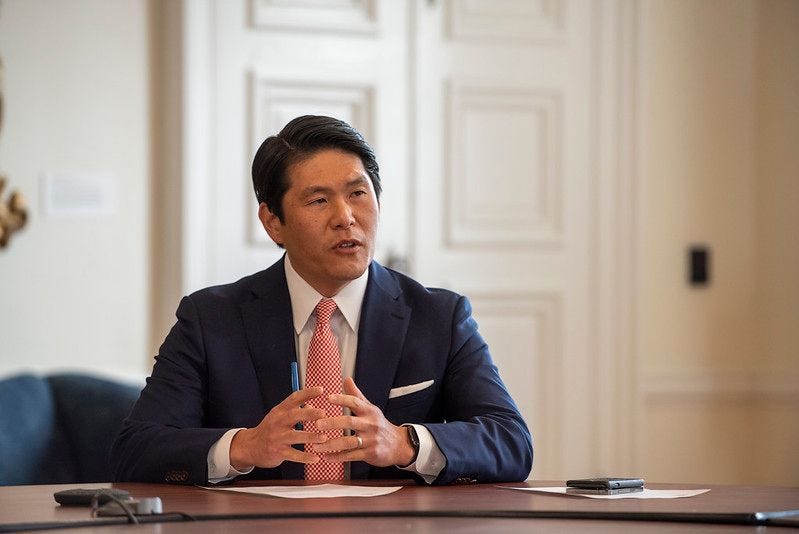
So, how big a deal is this?
In any Washington investigation, there are two elements to consider: the legal and the political.
Here are the legal facts at hand. On November 2 of last year, lawyers for Biden found 10 classified documents from his vice presidency sitting in a locked closet in the D.C. offices of the Penn Biden Center, an eponymous think tank the president worked out of during his time away from government.
According to CNN, the documents included intelligence memos and briefing materials related to Ukraine, Iran, and the United Kingdom; they were found in three or four boxes with other government documents that, while unclassified, should have been turned in at the end of the Obama administration.
Biden’s lawyers, who said they inadvertently made the discovery while closing out the Penn Biden office, promptly handed the documents over to the National Archives, which soon notified the Justice Department. A preliminary DOJ investigation was carried out by John Lausch, a Trump-appointed U.S. attorney in Chicago, who eventually recommended the appointment of a special counsel.
While Lausch was conducting his review, Biden’s lawyers informed him that they had found additional classified documents in the president’s garage at his home in Wilmington, Delaware. (“My Corvette is in a locked garage, OK? So it’s not like [the documents were] sitting out on the street” Biden said on Thursday.) The lawyers then called Lausch on Thursday to tell him that one more classified document had been found at the Wilmington home.
Under the Presidential Records Act, all presidential or vice presidential records are the property of the U.S. government and should be transferred to the National Archives at the end of an administration, which was clearly not done in this case.
Under the Espionage Act, it is a crime to willfully retain a national security document and and fail “to deliver it on demand.” Biden’s lawyers insist that the retention of documents was unintentional and everything that was found was immediately turned over, both facts which Hur will now investigate. (The DOJ has already begun interviewing former Biden aides to examine how the documents ended up at the Penn Biden office and in Wilmington.)
Prosecutors have cited both statutes in their ongoing investigation of former President Trump. Notably, there are many more documents at play in the Trump probe (the FBI found more than 13,000 documents, 325 of them classified, during its Mar-a-Lago search in August) and the two presidents have had very different responses to the probes, according to the information we know so far (the Mar-a-Lago search was approved by a judge because Trump had resisted the government’s efforts to retrieve the documents for more than a year).
Another notable difference in the two situations: the two presidents’ levels of legal protection. As you may recall from the Trump era, Justice Department policy precludes the sitting president from being charged with a crime, a protection now afforded to Biden. Trump has no such guarantee.
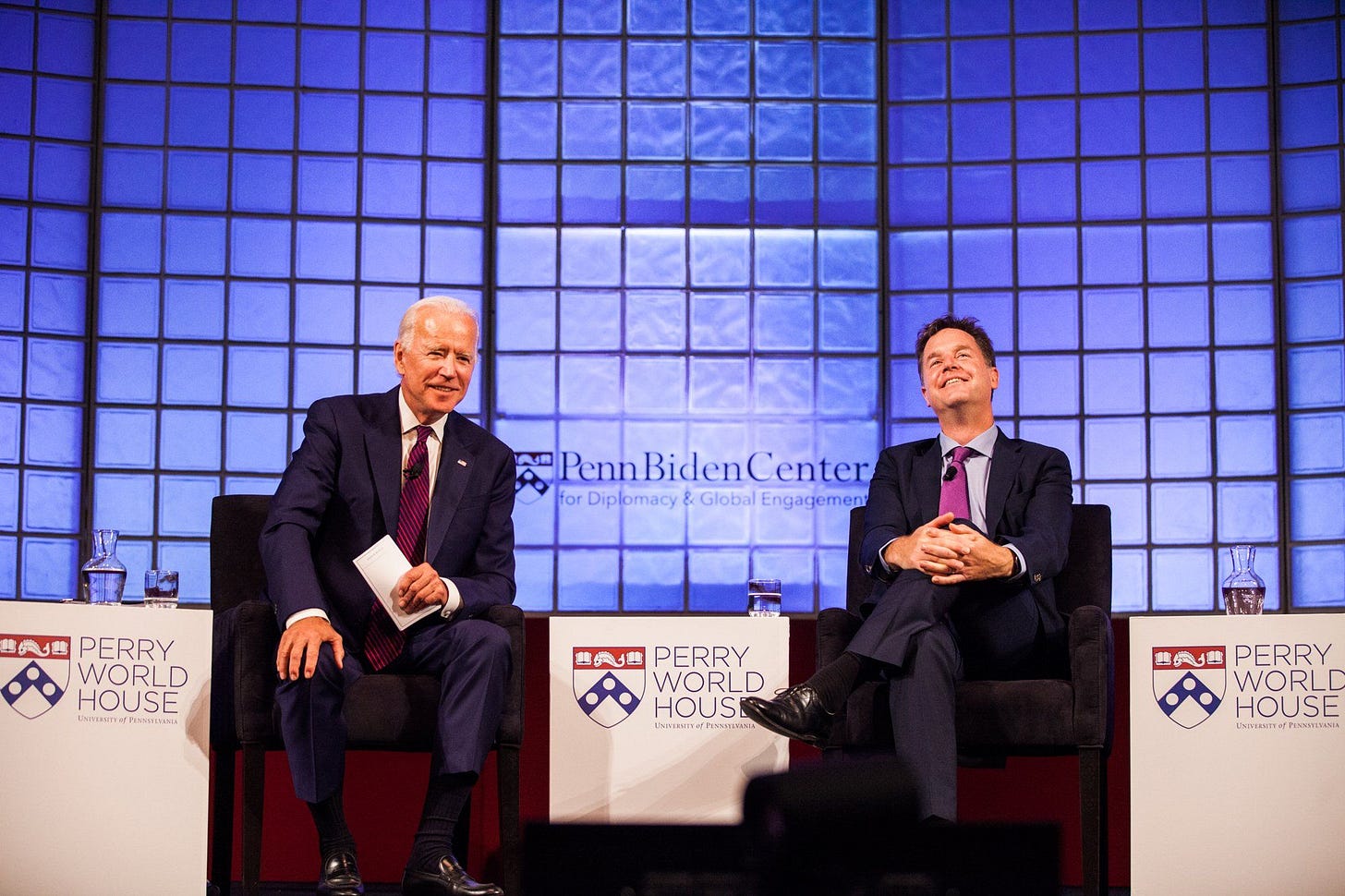
Politically speaking
Then there is the political side of things. Before CBS News broke the story on the documents discovery this week, Biden was riding relatively high. His party beat expectations in November’s midterms, effectively silencing worries from top Democrats about whether he should run for re-election in 2024.
The White House was gleeful after last week’s drawn-out House speakership balloting, planning to use the situation to prove their professionalism in contrast to the chaos playing out in the GOP. With his approval rating at its highest level since October 2021, Biden had hoped to use the first half of 2023 to barnstorm the country boasting about his accomplishments, setting up for his 2024 bid. His aides were eyeing a re-election announcement as soon as next month.
Now, just like his once-and-possibly-future rival, Biden marches into the 2024 campaign with an investigation into his handling of classified documents hanging over him. For the first time in his presidency, he faces not only a special counsel probe — but also a Republican-led House, which has just been handed its juiciest investigative target yet.
The 2020 and 2022 elections offered little evidence of high public interest in the Hunter Biden scandals, which the GOP had been planning to make its marquee Biden probe. Biden, by his own actions, has now given Republicans a possibly weightier weapon to batter him with.
At the very least, the investigations — both by Hur and by Republicans on Capitol Hill, who are already probing the matter — will serve as a distraction from what Biden had hoped would be a period when he could boast about his 2022 legislative wins and bask in Republican chaos. They will also neutralize any hopes Democrats may have had of using the Mar-a-Lago documents probe against Trump in 2024: even if the situations are not equivalent, Biden will presumably have no interest now in making the next campaign a referendum on the handling of classified documents.

Two lingering questions
There is a lot more to learn about the Biden documents case, some of which will likely emerge in the coming months as Hur and congressional Republicans sink their teeth into it. For now, two questions I have:
The timeline. Biden’s lawyers found the first tranche of classified documents on November 2, six days before the midterms. The president was informed of it that same day.
But the White House didn’t acknowledged the discovery until January 10, more than two months later, and only did so after CBS News reported on it. By that time, according to Garland’s statement on Thursday, the second batch of documents had already been found in Wilmington.
But, again, the White House was not transparent about the discovery, excluding mention of the already-discovered second batch of documents from its January 10 statement and only copping to the find after it had also been reported in the press.
On the first day of the Biden administration, then-press secretary Jen Psaki promised to “bring transparency and truth back to the government” and “to share the truth, even when it’s hard to hear.” Biden has also repeatedly bashed Trump for his handling of classified documents: “How could that possibly happen? How could anyone be that irresponsible?” he asked in a September interview on “60 Minutes.
Those are high standards to set, creating a lot of questions about why the White House didn’t meet them here. Why did they only acknowledge that the documents were found after the midterms, after the press had found out? And why didn’t they tell the whole truth, that documents had also been found in Wilmington, when they did?
The system. The twin failures of Trump and Biden to return all of their government documents after leaving the White House also call into question the system used by the government to log and keep track of classified documents. How often are lower-profile officials retaining documents after their service (either willfully or unintentionally) without being discovered because they don’t have the microscope of the presidency bearing down on them? How does this keep happening?
“I would daresay that if a sampling were taken of former presidents and vice-presidents, and even senior WH political staff, since the Carter Administration (which is when the Presidential Records Act was enacted), the American people would be surprised to learn how common it was for inadvertant mishandling of classified documents to occur,” Mark Zaid, a prominent national security lawyer, told me over email.
Zaid told me that both cases reflect a need to reconsider the classification system and the White House’s ability to keep track of classified documents. “The reality is that the number of classified documents created each year is voluminous and out of control, especially since electronic records became a mainstay of government communication,” he explained.
“This issue is non-partisan and important to the national security interests of the United States rather than any political party so one would hope efforts could be initiated to address these security deficiencies,” Zaid continued. “Alas, nowadays, everything is a fight.”
More news you should know.
➞ Inflation. A new Labor Department report on Thursday showed inflation in the U.S. easing in December for the sixth straight month, a sign that the Federal Reserve may be achieving a “soft landing” as it drives up interest rates in a bid to tamp down soaring prices. Read more
➞ Congress. Nebraska Gov. Jim Pillen announced plans to appoint his predecessor, Pete Ricketts, to the Senate seat vacated this week by Ben Sasse, who resigned to become president of the University of Florida. Ricketts and Sasse are both Republicans who have made notable breaks with Donald Trump: the former voted to convict him in his 2021 impeachment trial, the latter backed Pillen for governor over a Trump-endorsed primary rival. Read more
Plus, a few more headlines:
“Trump Organization ordered to pay $1.6 million fine for criminal tax fraud” CBS
“U.S. deficit widens by $85 billion in December” CNN
“The software blamed for FAA outage is three decades old and years from an upgrade, official says” NBC
“Baby boomers loosen their grip on Congress” Roll Call
“Whisper campaign about RNC chair candidate’s Sikh faith roils campaign” Politico
Circling back.
1/12/23, “Mr. Santos Goes to Washington”: The calls for George Santos, the serial fabulist New York congressman, to resign are growing. All six of Santos’ fellow New York Republican House freshmen have now publicly urged him to step down, after Reps. Marc Molinaro and Mike Lawler joined the calls on Thursday.
I also noted in the piece that Santos had “intriguingly” been seen hanging around Matt Gaetz during the speakership balloting and was increasingly adopting his pugilistic Twitter style. On Thursday, Gaetz posted a smiling photo with Santos and interviewed him on Steve Bannon’s radio show. (Bannon needed a fill-in host because he was in court for a hearing related to the fraud charges he faces in New York.)
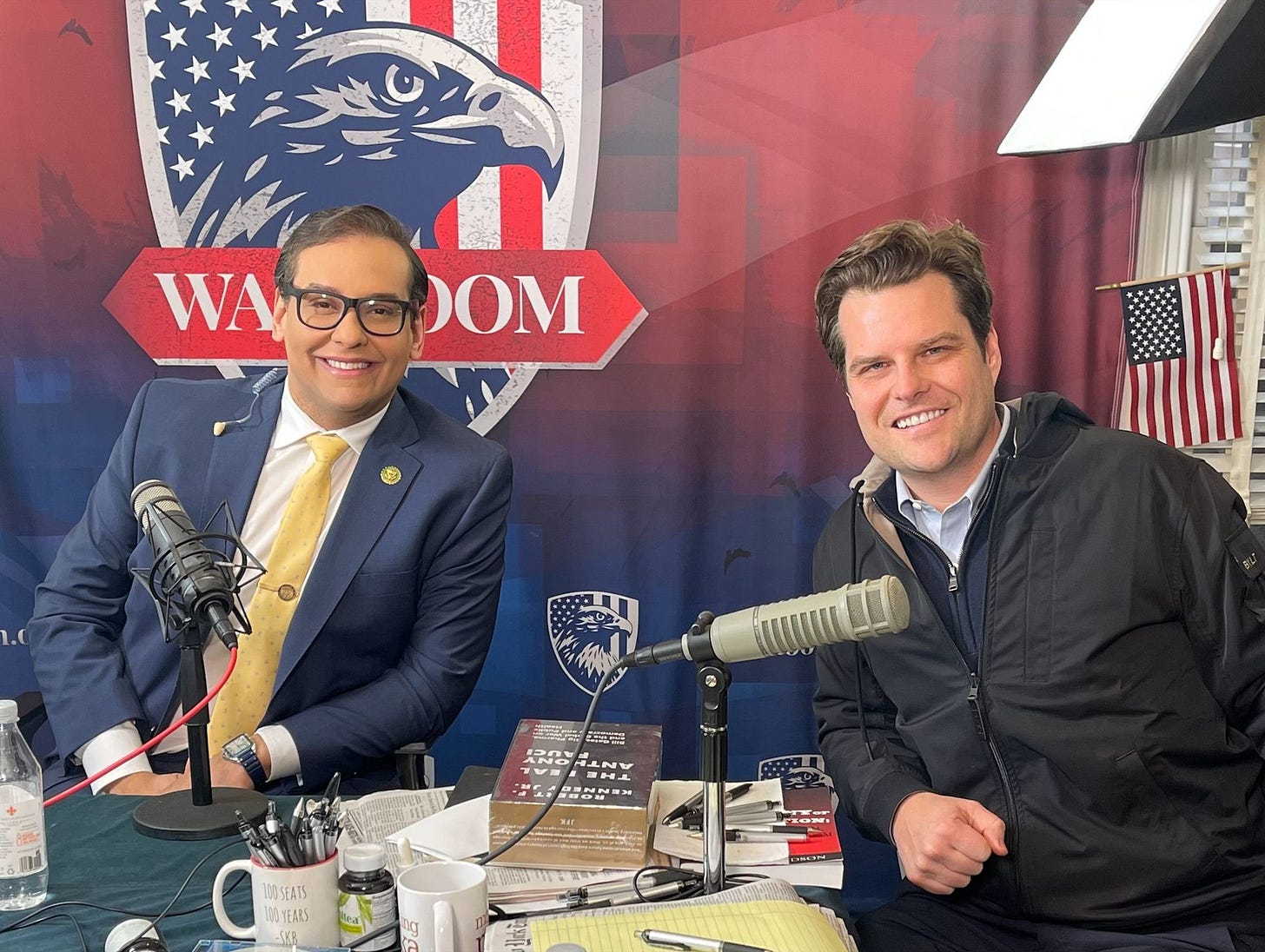
1/11/23, “A Golden State showdown”: Sen. Elizabeth Warren (D-MA) endorsed Rep. Katie Porter (D-CA) in the 2024 California Senate contest, even though 89-year-old Sen. Dianne Feinstein (D-CA) has yet to say if she’ll retire. It is highly unusual for a senator to endorse a challenger in a race when an incumbent of their own party is still putatively in the running; the endorsement could add pressure on Feinstein to step aside.
The endorsement does makes more sense, though, in the context of the deep personal ties between the two that I noted yesterday: Warren was a mentor of Porter’s at Harvard Law School, and Porter’s youngest daughter, Betsy, is named for Warren.
Ask Gabe: Could Santos be recalled?
Q: “Why isn’t there talk about recalling George Santos? What are the laws in New York about recall elections?” — Karen H.
A: This actually isn’t a matter of New York law. Both state and federal courts have agreed that states can’t pass laws that set new qualifications for members of Congress or prematurely modify the length of their service (through recall elections, term limits, or other means).
And because the Constitution includes no mechanism for recalling members of Congress, it would likely require a constitutional amendment to create one. (Interestingly, per the Congressional Research Service, there was discussion at the Constitutional Convention about including a way to recall lawmakers, although one was never agreed on. 19 states currently allow recall elections for state officials.)
The Constitution does, however, set out the only way a member of the House or Senate can face early removal: by a two-thirds vote of the chamber they serve in. The last member of Congress to be expelled was Rep. Jim Traficant (D-OH), who was kicked out of the House in 2002 after being convicted of bribery and racketeering.
Additional note: Some of you also emailed before Congress convened about whether the House could simply refuse to seat Santos at the beginning of his term. That’s not possible either: the Supreme Court ruled in 1969 that a chamber of Congress can only decline to seat a member if they do not fulfill the age, citizenship, or residency qualifications outlined in the Constitution.
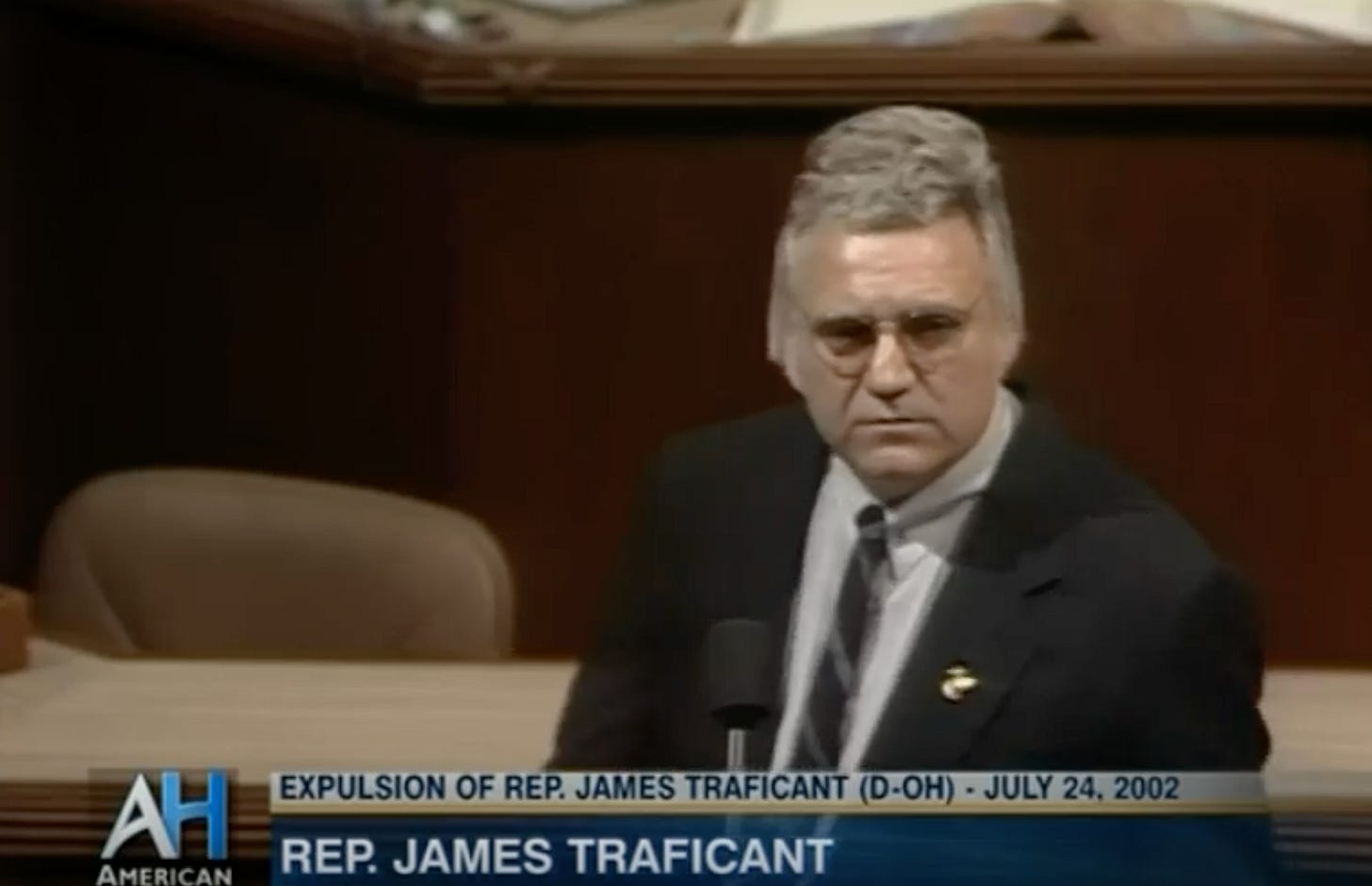
Q: “Why are the very slight majority Republicans allowed more than a slight majority of Republicans [on the select subcommittee investigating government abuses]?” — Jim M.
A: The majority party always has an edge on congressional committees, and the majority-minority ratio on the Select Subcommittee on the Weaponization of the Federal Government is the exact same one as Democrats gave Republicans on the January 6th panel (with the exact same-sized House majority): eight members for the majority, five from the minority.
(In the end, of course, the January 6th committee ratio became even more lopsided because Nancy Pelosi kicked off two Republican picks and then the GOP withdrew from participating altogether. Speaker McCarthy now has the same veto power over Democratic picks on select committees such as the weaponization panel.)
What your leaders are doing today.
All times Eastern.
Executive Branch
President Biden will receive his daily intelligence briefing and then welcome Prime Minister Kishida Fumio of Japan to the White House. Biden and Kishida will hold a bilateral meeting and then a working lunch, and then Biden will head off to Delaware for the weekend.
According to the White House, Biden and Kishida will “discuss a range of regional and global issues,” including North Korea, Ukraine, and Taiwan.
Vice President Harris will host Kishida for a working breakfast at her official residence.
Second Gentleman Doug Emhoff will mark National Religious Freedom Day by delivering remarks at a naturalization ceremony at the White House.
White House press secretary Karine Jean-Pierre and Keisha Lance Bottoms, the former Atlanta mayor who is now Biden’s senior adviser for public engagement, will brief the press. Watch at 12:30 p.m.
Legislative Branch
The Senate is on recess until January 23, but the chamber will briefly convene today for a pro forma session. This technically fulfills the constitutional obligation of meeting every three days, even though few members attend such meetings and no legislative business is conducted. Watch at 1:30 p.m.
The House will also meet briefly for a pro forma session. Watch at 11 a.m.
Judicial Branch
The Supreme Court will meet today for its weekly conference.
Before I go...
Here’s a fun fact: A relative of the “King of Rock and Roll” is running for political office.
Brandon Presley announced a campaign for the Mississippi governorship on Thursday, launching a challenge against Gov. Tate Reeves (R-MS). A longtime member of the state’s utility-regulating Public Service Commission, Presley is the highest-ranking Democratic state official in the Mississippi government.
The gubernatorial contender is also the second cousin of Elvis Presley, whose grandfather Jesse was the brother of Brandon’s grandfather Noah. Elvis died when Brandon was only one month old, but that didn’t stop the new candidate from mentioning his famous kin in his announcement video. “My cousin grew up just down the road in Tupelo,” Presley says, photo of Elvis in hand. “You’ve probably heard of him.”
Candidate Presley might be headed for “Heartbreak Hotel,” however: Reeves is heavily favored for re-election in deep-red Mississippi. (In case you were wondering: Mississippi is one of three states that will hold its gubernatorial election this November, along with Louisiana and Kentucky.)
Read more via the Clarion Ledger.
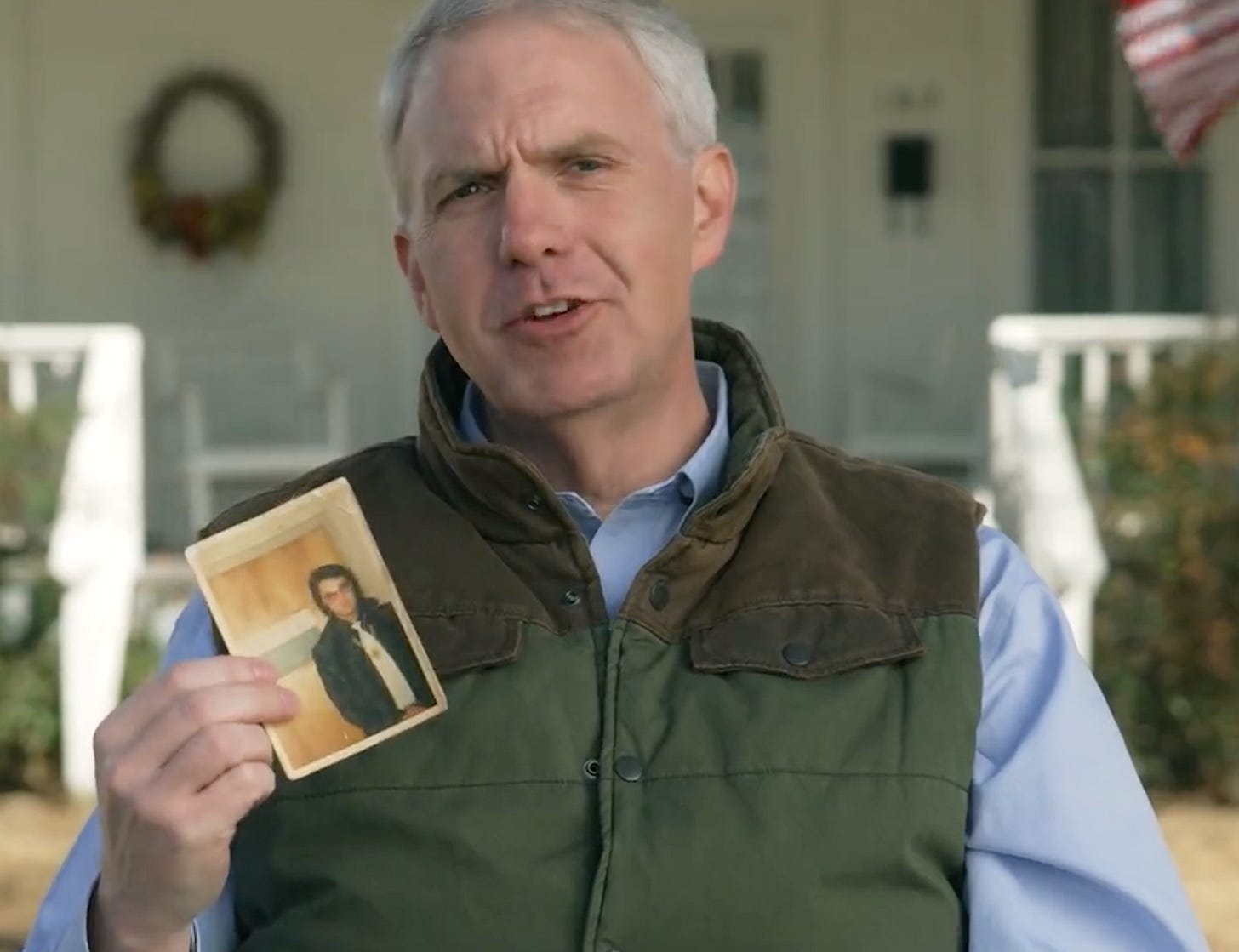
Thanks for reading.
I get up each morning to write Wake Up To Politics because I’m committed to offering an independent and reliable news source that helps you navigate our political system and understand what’s going on in government.
The newsletter is completely free and ad-free — but if you appreciate the work that goes into it, here’s how you can help:
Donate to support my work or set up a recurring donation (akin to a regular subscription to another news outlet).
Buy some WUTP merchandise to show off your support (and score a cool mug or hoodie in the process!)
Tell your family, friends, and colleagues to sign up at wakeuptopolitics.com. Every forward helps!
If you have any questions or feedback, feel free to email me: my inbox is always open.
Thanks so much for waking up to politics! Have a great day.
— Gabe



